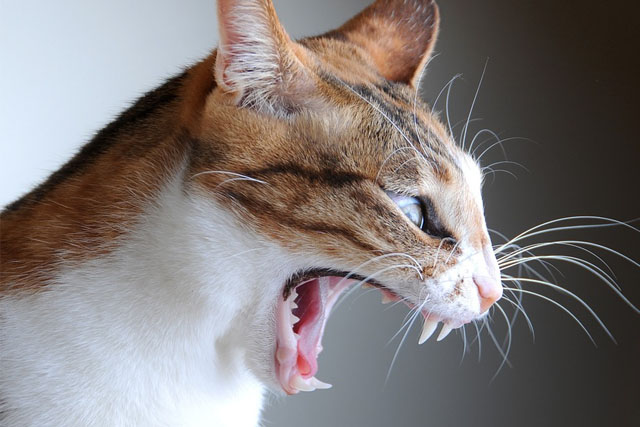Why has my cat's character changed? Possible reasons and solutions


1. Health issues
One possible reason for a cat's character to change is due to underlying health issues. Cats are masters at hiding their pain, so it's important to pay attention to any changes in their behavior. If your cat suddenly becomes more aggressive, withdrawn, or irritable, it could be a sign of an underlying health problem.
Common health issues that can affect a cat's behavior include urinary tract infections, dental problems, arthritis, and thyroid imbalances. If you notice any changes in your cat's behavior, it's important to take them to the vet for a thorough examination.
2. Changes in the environment
Cats are creatures of habit, and any changes in their environment can cause stress and anxiety, leading to a change in their character. Moving to a new home, rearranging furniture, or even introducing new objects into their space can disrupt their sense of security.
If you've recently made any changes in your cat's environment, give them time to adjust. Provide them with familiar objects, such as their bed or toys, and create a safe and quiet space where they can retreat to if they feel overwhelmed.
3. Stress or anxiety
Stress and anxiety can have a significant impact on a cat's behavior. Cats are sensitive animals, and they can easily become stressed by changes in their routine, loud noises, or even the presence of other animals.
If your cat's character has changed, try to identify any potential sources of stress in their environment. Provide them with a calm and predictable routine, and consider using pheromone diffusers or calming supplements to help reduce their anxiety.
4. Aging
As cats age, their behavior and personality can change. They may become more sedentary, less social, or develop age-related health issues that can affect their character.
If your cat is getting older and their behavior has changed, it's important to provide them with appropriate care and support. Regular veterinary check-ups, a comfortable and accessible environment, and a diet tailored to their specific needs can help them age gracefully.
5. Traumatic experiences
Cats can be deeply affected by traumatic experiences, such as abuse, accidents, or being attacked by other animals. These experiences can leave a lasting impact on their behavior and character.
If you suspect that your cat has experienced a traumatic event, it's important to provide them with a safe and secure environment. Give them plenty of time and space to heal, and consider consulting with a professional animal behaviorist to help them overcome their fears and anxieties.
6. Lack of socialization
Proper socialization is crucial for cats, especially during their early development stages. If a cat hasn't been adequately socialized as a kitten, they may exhibit fearful or aggressive behavior as adults.
If your cat's character has changed and they lack socialization, it's important to gradually expose them to new experiences and people. Start with small, positive interactions and reward them for calm and friendly behavior. Patience and consistency are key when helping a cat overcome socialization issues.
7. Changes in routine or schedule
Cats thrive on routine, and any changes in their daily schedule can cause stress and anxiety. This includes changes in feeding times, litter box cleaning, or playtime.
If your cat's character has changed, try to maintain a consistent routine for them. Stick to regular feeding times, keep their litter box clean, and provide them with daily play and exercise sessions. This will help them feel more secure and reduce any potential stress or anxiety.
8. Introduction of a new pet or family member
The introduction of a new pet or family member can significantly impact a cat's behavior. Cats are territorial animals, and they may feel threatened or anxious when a new individual enters their space.
If you've recently introduced a new pet or family member, it's important to give your cat time to adjust. Provide them with their own space where they can retreat to, and gradually introduce them to the new addition through positive and supervised interactions.
9. Lack of mental or physical stimulation
Cats are intelligent and active animals, and they require mental and physical stimulation to stay happy and content. If a cat is bored or lacks stimulation, they may exhibit destructive or attention-seeking behavior.
If your cat's character has changed, make sure they have plenty of toys, scratching posts, and interactive play sessions to keep them mentally and physically engaged. Puzzle toys and food-dispensing toys can also help stimulate their natural hunting instincts.
10. Behavioral issues
In some cases, a change in a cat's character may be due to underlying behavioral issues. This can include aggression, excessive vocalization, or inappropriate elimination.
If you suspect that your cat's character change is due to a behavioral issue, it's important to consult with a professional animal behaviorist. They can help identify the root cause of the problem and provide you with a tailored behavior modification plan.
In conclusion, there can be various reasons why a cat's character may change. It's important to pay attention to any changes in their behavior and address any underlying health issues, environmental changes, stress, or anxiety. Providing them with a safe and secure environment, socialization, mental and physical stimulation, and seeking professional help when needed can help your cat regain their true character and live a happy and fulfilling life.


Related posts